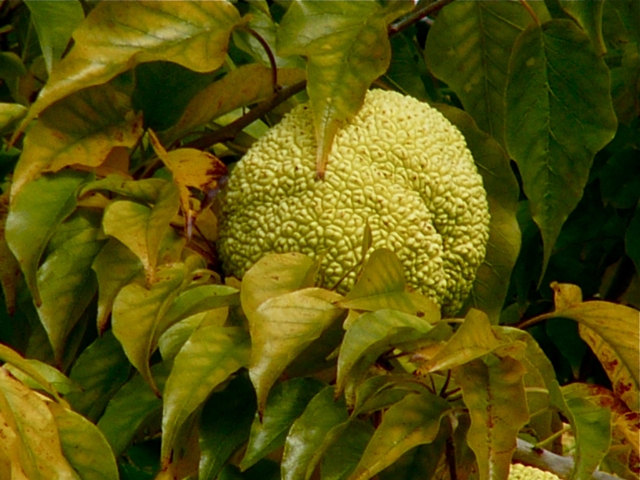Osage Orange
(Maclura pomifera)
Osage Orange (Maclura pomifera)
/
/

Jean Pawek
CC BY 3.0
Image By:
Jean Pawek
Recorded By:
Copyright:
CC BY 3.0
Copyright Notice:
Photo by: Jean Pawek | License Type: CC BY 3.0 | License URL: http://creativecommons.org/licenses/by/3.0/ | Attribution: 2010 Jean Pawek | Publisher: Calphotos |






















































Estimated Native Range
Summary
Maclura pomifera, commonly known as the Osage orange, bois d’arc, horse apple, hedge, or hedge apple tree, is a small to medium-sized deciduous tree or large shrub, native to the Red River drainage of Oklahoma, Texas, and Arkansas, but has been widely naturalized elsewhere. It typically grows to 8 to 15 meters (30–50 ft) tall with a short trunk and a rounded or irregular crown. The leaves are a shiny medium to dark green, turning yellow in the fall. The bark is deeply furrowed, providing winter interest. The plant is dioecious, with male and female flowers on separate trees. The female trees produce distinctive fruits, which are multiple fruits, roughly spherical, bumpy, 8 to 15 centimeters (3–6 in) in diameter, and turn bright yellow-green in the fall. The fruits secrete a sticky white latex when cut or damaged.
Osage orange is valued for its hard, rot-resistant wood and has been used historically for fence posts and archery bows. Its dense foliage and thorny branches make it an effective hedge plant, hence the common name "hedge apple." It is also planted for wildlife habitat, as the fruit is a food source for animals, although generally not for humans. In cultivation, it adapts to a range of soil types but prefers deep, fertile, well-drained soils. It is drought-tolerant once established and can handle full sun to part shade. Regular pruning is necessary to maintain its shape and prevent it from becoming too large. While it has few serious pest or disease problems, the fruit can be a nuisance in urban areas, and the tree can spread aggressively via root suckers if not managed.CC BY-SA 4.0
Osage orange is valued for its hard, rot-resistant wood and has been used historically for fence posts and archery bows. Its dense foliage and thorny branches make it an effective hedge plant, hence the common name "hedge apple." It is also planted for wildlife habitat, as the fruit is a food source for animals, although generally not for humans. In cultivation, it adapts to a range of soil types but prefers deep, fertile, well-drained soils. It is drought-tolerant once established and can handle full sun to part shade. Regular pruning is necessary to maintain its shape and prevent it from becoming too large. While it has few serious pest or disease problems, the fruit can be a nuisance in urban areas, and the tree can spread aggressively via root suckers if not managed.CC BY-SA 4.0
Plant Description
- Plant Type: Tree, Shrub
- Height: 20-40 feet
- Width: 20-40 feet
- Growth Rate: Moderate
- Flower Color: N/A
- Flowering Season: Spring
- Leaf Retention: Deciduous
Growth Requirements
- Sun: Full Sun, Part Shade
- Water: Medium
- Drainage: Fast, Medium
Common Uses
Deer Resistant, Drought Tolerant, Hedges, Salt Tolerant
Natural Habitat
Native to the Red River drainage of Oklahoma, Texas, and Arkansas
Other Names
Common Names: Mock Orange, Hedge Apple, Horse Apple, Monkey Ball, Monkey Brains, Yellow-Wood, Bodark, Bowwood, Hedge-Apple, Osage-Orange
Scientific Names: , Maclura pomifera, Ioxylon pomiferum, Maclura pomifera var. inermis, Maclura aurantiaca, Toxylon pomiferum, Broussonetia tinctoria, Ioxylon aurantiacum, Ioxylon maclura, Joxylon pomiferum
GBIF Accepted Name: Maclura pomifera (Raf. ex Sarg.) C.K.Schneid.